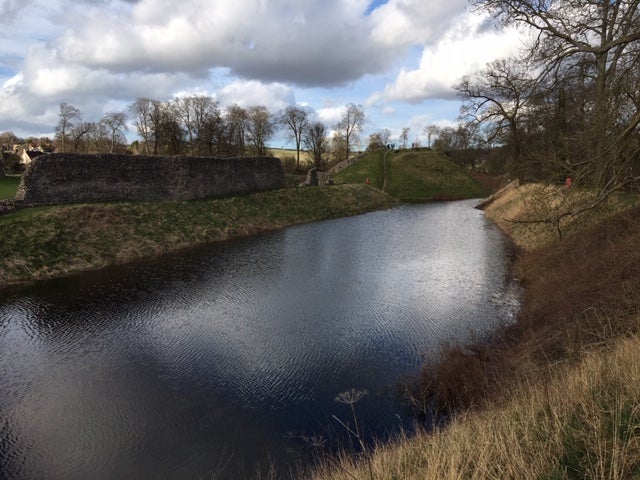Who will be king of the castle when climate change brings the walls down?
In his latest reflection on places and pathways, Will Gore sees his son enthralled by a brimming moat at Berkhamsted Castle


Let’s be honest, getting a child to go out for a walk can be a gruelling business. The simple act of popping to the shops, barely half a mile distant, can bring on the most almighty of tantrums. The sweets and ice cream bribes I’ve had to offer in an effort to persuade my kids to leave the house are too many to mention.
But then once in a glorious blue moon, something wonderful happens and a small face doesn’t go puce when you suggest a stroll.
A week ago I bore witness to such a moment when my son agreed not only willingly, but with a something approaching gusto, to go for a trog around the ruins of Berkhamsted Castle.
The remains of this significant construction are impressive. If you’ve ever travelled on the main line out of (or into) London Euston, you’re likely to have seen it from the train window – the castle being a mere stone’s throw away, to the east of the railway.
Its history is as impressive as its size, if not more so. When the Normans invaded in 1066, it was at Berkhamsted that the English finally submitted to William the Conqueror. Within a decade, William’s loyal brother, Robert of Mortain, had built a timber castle at the town – using a classic motte and bailey design. It was a key guardian of the northern route towards London.
In the middle of the next century, Berkhamsted Castle was granted to Thomas Becket and was substantially rebuilt in stone. In the 13th century it was besieged by Prince Louis of France, in support of the English barons’ fight to unseat King John; and subsequently became the administrative headquarters of Richard, Earl of Cornwall, reputedly England’s richest man.
Later it became the home of Edward, the Black Prince, heir to Edward III, who made further adornments to the complex. By the end of the 15th century, however, it had fallen into disuse, no longer of strategic importance to the crown; and over the next hundred years or so the castle gradually fell into ruins.
I don’t think my four-year-old son is massively interested in any of this; not yet anyway.

Rather, he was drawn by the simple prospect of seeing the castle’s moat brimming with water. For on our many visits since he was born, never has the moat been even close to full: the odd muddy patch has been about as good as it has got, even in wetter winters.
And sure enough, it is an impressive sight: the inner moat wide, and awarded the impression of significant depth by the steep earthworks on either side; an outer ditch is narrower, but it too was saturated and glistening in the sun last week, emphasising the scale of the place.
There is a danger of overhyping historical sites, but Tristan was generally enthralled to see the castle encircled by a river that rippled in the stiff breeze. He ran a full lap of the outer rampart, while I watched on, a little anxious that he would trip and tumble down into the water, but mostly feeling my heart leap at his excitement.
Yet I couldn’t help but recall that, when we first came to Berkhamsted more than a decade ago, the moat was regularly full. Coots and moorhens nested in reed islands in its midst, their chicks swimming in the shelter of the castle’s vast earthen walls. Now, seeing it awash is a novelty, for the ducks as well as for human visitors; and to reach this state it seemingly requires rain of the sort that has left thousands of homes in England and Wales flooded.
Our climate is changing so quickly; when you stop to look, the fact is evident all around. The child is father of the man; but what will our children make of the ruins their fathers have created?
Join our commenting forum
Join thought-provoking conversations, follow other Independent readers and see their replies
Comments